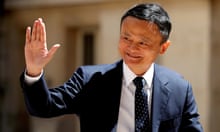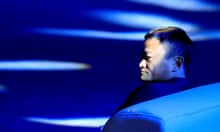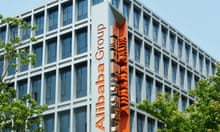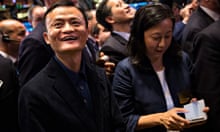China has escalated its campaign to rein in the vast tech empire controlled by Jack Ma, the co-founder of Alibaba and one of the country’s richest people.
Authorities in Beijing, who had on Christmas Eve ordered an investigation into allegations of “monopolistic practices” by Ma’s online retail giant, have now ordered his financial technology company Ant Group to scale back its operations.
Pan Gongsheng, a deputy governor of China’s central bank, said Ant’s corporate governance was “not sound” and ordered it to “return to its origins” as a payment services provider.
Pan, who had summoned Ant representatives to a meeting with regulators in Beijing on Saturday, said Ant must “strictly rectify illegal credit, insurance and wealth management financial activities”. Ant divisions offering those services are the business’s fastest-growing and most profitable operations, analysts said.
He stopped short of calling for a full break-up of the Ant empire, but said Ant Group should set up a separate holding company to ensure regulatory compliance. Ma was advised by the Chinese government to stay in the country, Bloomberg reported, citing a person familiar with the matter.
In a statement, Ant Group said it would establish a “rectification working group” and “fully implement requirements” sought by the regulator.
“We will enlarge the scope and magnitude of opening up for win-win collaboration, review and rectify our work in consumer rights protection, and comprehensively improve our business compliance and sense of social responsibility,” the company said. “Ant will make its rectification plan and working timetable in a timely manner and seek regulators’ guidance in the process.”
The latest salvo in Beijing’s battle against Ma – who had been feted as China’s greatest modern-day entrepreneur until he started speaking out against strict regulations – wiped 8% off the value of Alibaba’s share price in Hong Kong trading on Monday.
Alibaba’s shares have lost more than a quarter of their value since 24 October, when Ma accused China’s financial regulators and state-owned banks of operating a “pawnshop” mentality at a high-profile summit in Shanghai.
Chinese Communist party officials hit back, accusing Ma’s company’s of breaching various regulations and intervened to block the $37bn (£27bn) flotation of Ant Group just two days before dealing was due to begin in Shanghai and Hong Kong.
The crackdown on Ma’s business activities has wiped more than $10bn (£7.4bn) from his fortune, and knocked him into second place on the list of China’s richest people with an estimated $49bn, according to the Bloomberg billionaires index. The wealthiest person in China is now Pony Ma (no relation), the chairman and chief executive officer of the rival tech firm Tencent.
Zhang Zihua, chief investment officer of the asset manager Beijing Yunyi Asset, said investors were concerned that Beijing’s campaign against Ma’s companies could continue even if they implemented all the changes required. “The antitrust investigation into Alibaba has yet to specify the penalties, which is worrying investors a lot,” he said.
Li Chengdong, a Beijing-based technology analyst, said the action against Ant was also weighing heavily on other Chinese tech companies. “The new regulations are hurting big internet platforms, so Tencent and other tech companies are also seeing their share prices going down,” Li said. “Alibaba now is the target of the regulators so the reaction is stronger.”
On Christmas Eve China’s state market supervision administration said it had ordered an investigation into Alibaba Group Holdings Ltd over “suspected monopolistic practices”.
An editorial in the People’s Daily Chinese state mouthpiece said efforts to prevent monopoly and anti-competitive practices were “requirements for improving the socialist market economy system and promoting high-quality development.
“This investigation does not mean that the country’s attitude towards the encouragement and support of the platform economy has changed.”

Analysts and policy experts said Beijing’s action against Ma’s companies was likely to have been sparked by the blunt speech he gave to the Bund summit in Shanghai on 24 October, criticising overbearing regulation and the state dominance of banking.
“We shouldn’t use the way to manage a train station to regulate an airport,” Ma said, according to a transcript. “We cannot regulate the future with yesterday’s means.
“It is impossible for the pawnshop mentality to support the financial demand of global development over the next 30 years,” said Ma, who started Alibaba in a one-bedroom flat in China 21 years ago. “We must leverage our technological capabilities today and build a credit system based on big data, to get rid of the pawnshop mentality.”
Ma was speaking alongside senior officials such as Wang Qishan, a former security tsar and the Chinese leader Xi Jinping’s right-hand man; Yi Gang, the governor of China’s central bank; and Zou Jiayi, vice-minister at the ministry of finance. Ma’s comments went viral on Chinese social media and were seen as a direct attack on government officials.
In November, Ant Group was preparing for what would have been the world’s largest initial public offering when it was suddenly shut down by Beijing, 48 hours before trading would have begun in Shanghai and Hong Kong. Before the suspension, investors had valued Ant at $316bn (£234bn), more than the valuations of China’s biggest banks and those of the US and the UK.
At the time the halt was blamed on “changes to the financial technology regulatory environment and other major issues”, but analysts interpreted the intervention as a warning to Ma.
“The party has once again reminded all private entrepreneurs that no matter how rich and successful you are it can pull the rug out from under your feet at any time,” wrote Bill Bishop, author of the China-focused newsletter Sinocism.










